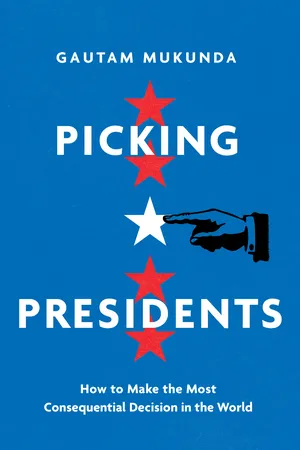
Picking Presidents
How to Make the Most Consequential Decision in the World
- 288 pages
- English
- ePUB (mobile friendly)
- Available on iOS & Android
About This Book
"If you only read one book to understand how Democrats will, and should, pick a new nominee—and the stakes of the general election—read Picking Presidents, which explains how to judge if a Presidential candidate is worthy of sitting in the Oval Office."—Thomas L. Friedman, New York Times columnist and Pulitzer Prize-winning journalist and author Celebrated leadership expert and political scientist Gautam Mukunda provides a comprehensive, objective, and non-partisan method for answering the most important question in the world: is someone up to the job of president of the United States? In Picking Presidents, Gautam Mukunda sets his sightson presidential candidates, proposing an objective and tested method to assess whether they will succeed or fail if they win the White House. Combining political science, psychology, organizational behavior, and economics, Picking Presidents will enable every American to cast an informed vote. In his 2012 book Indispensable, which all but predicted the Trump presidency, Mukunda explained how both the very best and very worst leaders are "unfiltered"—outsiders who take power without the understanding or support of traditional elites. Picking Presidents provides deep analysis of filtered and unfiltered presidents alike, from failed haberdasher and skillful president Harry Truman, to the exceptionally well-qualified—and ultimately reviled—James Buchanan; from Andrew Johnson, who set civil rights back by a century, to Theodore Roosevelt, who evaded party opposition to transform American society. Picking Presidents lays out a clear framework that anyone can use to judge a candidate and answer the all-important question: are they up to the job?
Frequently asked questions
Information
Table of contents
- Title
- Copyright
- Dedication
- Epigraph
- Contents
- List of Tables and Figure
- Preface
- Acknowledgments
- 1. The Fateful Choice
- 2. Harry Truman and the System at Its Best
- 3. James Buchanan and the Collapse of the System
- 4. Unhappy in Their Own Way: Failed Unfiltered Presidents
- 5. Five Stars and a Bull Moose: The Triumph of Unfiltered Presidents
- 6. Assessing Filtered and Unfiltered Candidates
- Conclusion. Where Do We Go from Here?
- Appendix: Statistical Analysis, Case Selection, and Theoretical Concerns
- Notes
- Bibliography
- Index